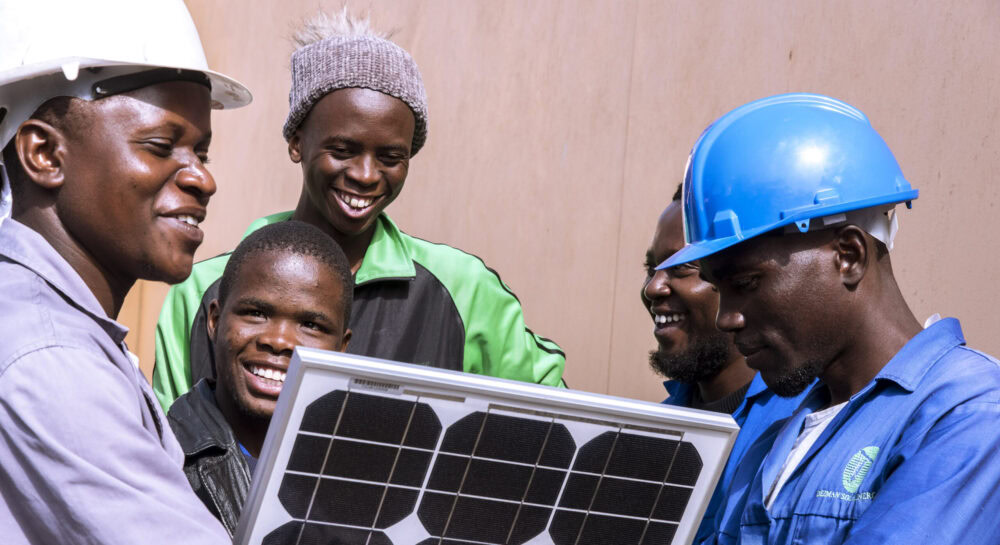Greenovating TVET
Youth represents our most valuable asset in striving to attain the UN Sustainable Development Goals.
Young Africa’s mission is to equip young people with essential skills and a shared aspiration to reshape their society into a greener, more sustainable future, fostering global prosperity and equality for everyone.
About the Programme
Africa, the world’s youngest continent, faces an urgent need to create meaningful opportunities for its youth. With 12 million young people entering the job market each year but only 3 million formal jobs available, the gap between job demand and availability is widening. Meanwhile, the effects of climate change are reshaping economies across the continent, making sustainability a critical priority for future development.
In partnership with the Nationale Postcode Loterij, Young Africa is implementing the Greenovating TVET initiative to address these challenges and unlock the potential of Africa’s youth. By integrating green skills and environmentally sustainable practices into technical and vocational training, this project equips young people with the expertise needed to excel in industries such as renewable energy, sustainable agriculture, and waste management.
At the Zimbabwe Model TVET Centre, sustainable practices will be embedded into operations and curricula, providing a practical example for future replication.
By combining practical training with a commitment to sustainability, Greenovating TVET creates pathways for youth employment while promoting environmental stewardship. Together, we are working toward inclusive growth and a greener, more sustainable future.

Objectives of the project
The Greenovating TVET initiative focuses on addressing youth unemployment and advancing sustainability by integrating green practices into vocational training.
Embed Sustainability into Training and Operations
Young Africa will integrate sustainability principles into its TVET programs and operations. This includes creating seven green curricula aligned with industry needs and developing a Greening and Sustainability Strategy to embed environmental consciousness throughout the organisation.
Pilot Green Initiatives at the Zimbabwe Model Centre
A pilot project at the Zimbabwe Model Centre will test and refine greening practices. This initiative will generate key lessons and establish a scalable framework for sustainable operations at other centres.
Foster Innovation in Green and Digital Training
The project will equip youth with skills in green and digital professions, preparing them for careers in sectors like renewable energy, sustainable agriculture, and waste management.
Expand Organisational Capacity and Strategic Growth
Young Africa will strengthen its operational structure and adopt innovative solutions to scale its impact, supporting organisational growth and long-term sustainability.
Boost Visibility and Stakeholder Engagement
The initiative will enhance Young Africa’s outreach, engaging stakeholders and building partnerships to scale green education and expand its network across Africa.
Key outcomes
Our approach
S2L uses mobile training units to reach underserved communities and centre-based hubs for hands-on education in trades like welding, tailoring, and cosmetology.
Wellness centres at training sites provide counselling, mental health support, and SRH education, addressing critical barriers to well-being.
By offering entrepreneurship training and green skills like agroforestry and waste management, S2L equips youth with future-ready tools.
The programme includes tailored support for young mothers, such as child-minding services and savings groups.
Through mentorship, job placement, and financial literacy programmes, S2L ensures that graduates transition successfully into employment or entrepreneurship.
Mobile and Centre-Based Training
S2L uses mobile training units to reach underserved communities and centre-based hubs for hands-on education in trades like welding, tailoring, and cosmetology.
Integrated SRHR Services
Wellness centres at training sites provide counselling, mental health support, and SRH education, addressing critical barriers to well-being.
Entrepreneurship and Green Courses
By offering entrepreneurship training and green skills like agroforestry and waste management, S2L equips youth with future-ready tools.
Empowering Women and Mothers
The programme includes tailored support for young mothers, such as child-minding services and savings groups.
Post-Graduation Support
Through mentorship, job placement, and financial literacy programmes, S2L ensures that graduates transition successfully into employment or entrepreneurship.
Accessibility and Innovation
One of S2L’s defining features is its commitment to accessibility. The programme uses mobile training units to deliver vocational education to remote and underserved areas, ensuring no young person is left behind. Participants gain hands-on skills in trades like welding, tailoring, cosmetology, and food production, preparing them for in-demand jobs or entrepreneurship opportunities.
Health and well-being are integral to the programme’s success. Wellness centres at training sites provide participants with critical services, including mental health counselling, SRH education, and child-minding facilities for young mothers. This support enables youth to fully engage in their training, reduces dropout rates, and builds confidence in their personal and professional lives.
S2L’s focus on entrepreneurship has also empowered participants to launch their own businesses. By 2023, 620 youth-led enterprises were established, ranging from small-scale catering services to innovative green businesses using recycled materials. Additionally, partnerships with microfinance institutions and savings groups have provided financial resources for graduates to sustain and grow their ventures.
Our impact so far
Other projects
SUNstainable Youth Empowerment
According to the World Bank, only 28% of the population has access to electricity, with a stark urban-rural divide, exacerbating the impact of energy shortages. The transformative programme at the Lilayi Centre is designed to address youth unemployment, energy shortages, and environmental needs in Zambia.
ZambiaYouth Employability Booster
The Youth Employability Booster initiative tackles youth unemployment in Nigeria by delivering innovative vocational training and entrepreneurial support.
NigeriaSkills for Youth Resilience Programme (SYRP)
By promoting sustainable livelihoods in Mozambique and Zimbabwe, the initiative drives meaningful economic growth, social empowerment, and strengthened organizational capacity.
Zimbabwe